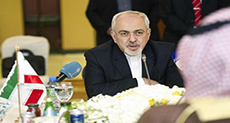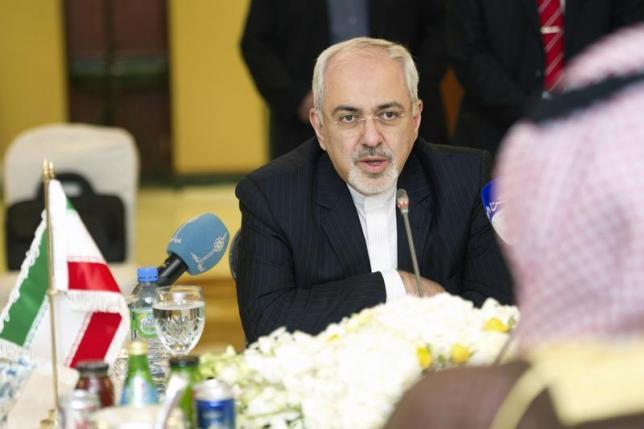Zarif to the Saudis: Neighbor Comes before Home

Local Editor
In a remarkable initiative following the nuclear agreement and during a tour that included Kuwait, Qatar and Iraq, Iran's Foreign Minister Mohammad Javad Zarif called for searching for mechanisms that would help all the countries of the region: where trust is absent, uproot tension and its factors.

In his article, Zarif stressed that the need to a smart evaluation to the complexities of the region is undeniable. This would aid in finding long-term policies to resolve these issues, one of which is fighting terrorism.
Zarif considered that Yemen could demonstrate a good example to what he called "Serious talks" between Tehran and its neighboring countries, reminding of Iran's plan to solve the crisis in Yemen as well as the previous plan to solve the Syrian crisis. He said these "strategic talks" can be used to settle major issues such as fighting terrorism and extremism, preventing sectarian wars, and the rise of relations between the Muslim countries of the region.
The following is the article written by the Foreign Minister of the Islamic Republic of Iran Mohamamd Javad Zarif:
According to our ancient traditions and Islamic religion [which brings us together]; a wise proverb says "The neighbor comes before the home." It is a moral advice of deep vision that has been passed on to us throughout the centuries. This moral value has become a necessity that cannot be denied in our modern world. Well-being and security can only be accomplished in an environment that allows the existence of these two great blessings.
The first priority of Iran, since the very beginning, has been to establish kind and strong relations with its neighbors. This priority has been clearly made public and is seriously pursued, especially since the formation of the new Iranian government.
My new regional trip which included three neighboring countries; Kuwait, Qatar and Iraq, which took place right after the historical nuclear deal was concluded between Iran and the P5+1 countries in Vienna, is a confirmation of this strategy, to which Iranian foreign policy pays great attention.
Our region is currently passing through turbulences, and faces serious dangers that threaten the foundations of society and culture hereat.
Although Iran, which relies upon a people that is steadfast and flexible in facing authoritarian tendencies, it basks, thankfully, in stability and security, and has presented new horizons in constructive behavior, it can never remain indifferent to the deep destruction happening at its borders, especially since experience has shown that chaos and turbulences know no limits, and it is impossible to guarantee the security of any country in a turbulent environment in this world, marching towards globalization.
The Vienna deal was a necessary beginning for the region. The deal not only does not cause any damage to our neighboring countries, but is also to the benefit of the region as a whole, as it puts an end to 12 years of needless tension, which was more of a threat to the region than anything else. The time has come to dedicate all our time for more important matters, starting with searching for mechanisms that would help all the countries of the region uproot the tension and its factors amid the absence of trust.
The formation of a regional dialogue forum in our region that would later include all the countries of the Islamic world in the Middle East, is a dire need that should have been approached long ago. The regional dialogue should take place within common goals and general principles that are acknowledged by the countries of the region, the most important of which:
Respect for the sovereignty, territorial integrity and political independence of all countries, not breaching their borders, not-interfering in their internal affairs, peaceful settlement of disputes, prohibition of threats or use of force, and the promotion of peace, stability, development and prosperity in the region.
We all have to accept the fact that the time of useless games is at an end, and accept that we all either win or lose together because constant security cannot be achieved by harming the security of others. Also, no nation can think of its own interests taking the interests of others into account. This is our fate whether we like it or not: "And obey Allah and His Messenger, and do not dispute and [thus] lose courage and [then] your strength would depart; and be patient. Indeed, Allah is with the patient. [Surah 8: Al-Anfal, Verse 46].
Of course, this inevitable cooperation is not some kind of bitter work with enemies, it is rather a pleasant path towards reform and affection between siblings and family, who had moved away from each other for some time: "The Believers are but a single Brotherhood: So make peace and reconciliation between your two [contending] brothers" [Surah 49: Al-Hujurat; Verse 10].
The practical application of these verses in our region and in the Middle East is very important. It is more important to this region than any other region in the world. We cannot deny the need to conduct a smart evaluation of the complexities of the region, with the aim of finding long-term policies to resolve these matters, one of which is combatting terrorism. No one can fight extremist groups, such as the so-called Islamic State - which is neither a state, nor Islamic - in Iraq, whilst it spreads in Yemen and Syria.
If we had to choose one of the crises in the region to begin serious talks, Yemen would present a good example. Iran has suggested a reasonable and practical solution to this painful and unnecessary crisis. The four-point Yemen peace plan I presented includes an immediate cease-fire, sending humanitarian aid to Yemeni civilians, facilitating dialogue between different Yemeni sides inside the country, and at the end, directing them towards forming an all-inclusive national unity government.
Also, two years ago, a similar plan was suggested after consultations took place with Syria and some neighboring countries, as well as all sides that were active in restoring peace and security to Syria. This plan could be added to the agenda with efforts being made to find a settlement to the Yemeni crisis, which would be in cooperation with other Muslim countries, and under the supervision of UN mechanisms.
In parallel, some strategic talks could be made to carry out precise steps towards achieving better understanding, to study and resolve cases such as terrorism and extremism, prevent sectarian wars, diversifying scientific, industrial and developmental cooperation, and developing relations between the region's Islamic countries.
Nuclear cooperation for peaceful purposes might set an outstanding example for this pattern of cooperation, because Iran and all the Muslim countries in the region have the right to obtain the benefits of peaceful nuclear technology under international laws and regulations. The countries of the region should cooperate to reach these goals. Similar patterns of cooperation include:
- Benefitting from enrichment by setting up a regional center to generate nuclear fuel, which would happen through collaboration region's Islamic countries on the technical level. Meanwhile, and on the political level, tremendous efforts should be made to establish a demilitarized zone [free of Weapons of Mass Destruction] in the Middle East.
In conclusion, we, the countries of the Middle East region, who are brought together by many diverse matters whether religious, cultural, political or geographical, all possess the requirements of starting constructive cooperation that can be beneficial to all our nations and to the nations of the world.
The many challenges in our region are so dangerous and crucial that we should not be distracted by sectarian arguments and personal conflicts, but we should rather move forward, with insight and courage towards this lively cooperation to resolve the origin of the crises in our region. We should not have hopes that our problems be solved by those who created them in first place.
This is the only chance for cooperation, and our peoples expect us not lose this chance: "And say, ‘Do [as you will], for Allah will see your deeds, and [so, will] His Messenger and the believers'." [Surah 9: Al-Tawbah, Verse 105].
Source: as-Safir, Translated and Edited by website team
Comments




